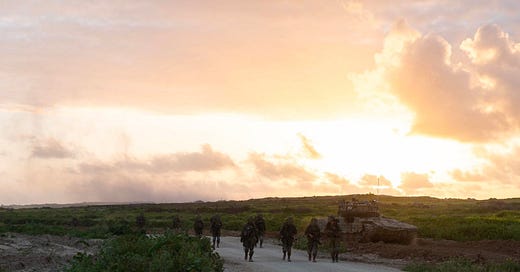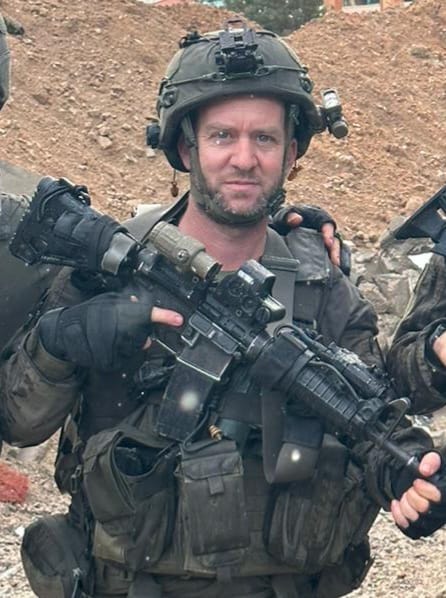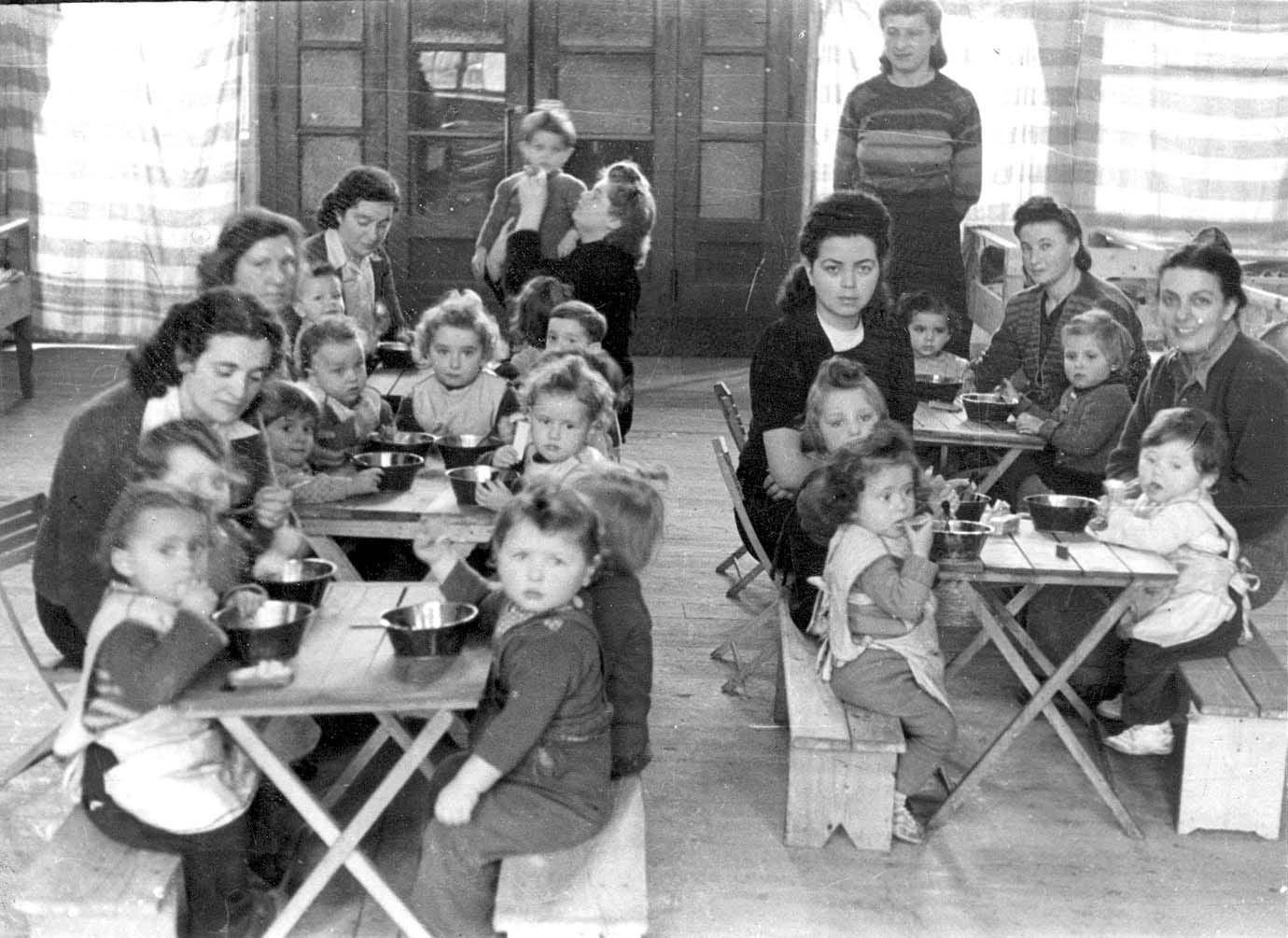DAY 155 OF THE GAZA WAR: Treading Water in Gaza, US To Build Mobile Port, Chief Rabbi Threatens to Leave the Country
Tel Aviv Diary, March 9, 2024
IN GAZA
This was another day in Gaza of what correspondents have increasingly characterizing as “treading water”. Israeli forces continue to target Hamas militants in day-to-day combat, yet there is minimal advancement on the ground. There is deep concern that the longer our troops remain static, in one spot, the greater the danger they face. In the Hemed neighborhood of Khan Younis, the primary area where we are currently fighting, we lost another major in combat, Major (res.) Amishar Ben David (43).
Here's what the IDF said about this recent action:
In the last day, the combat team fighters of the Light Infantry Brigade (828), fighting in the Khan Younis area, eliminated over 20 terrorists in face-to-face battles and in airstrikes. In offensive operations by the Givati Brigade's combat team in the Hemed neighborhood, the forces raided several terror infrastructures in the area, arrested a number of terrorists from the organizations in the Strip, and found explosive devices alongside other weaponry in the area.
In additional activities in the area, the brigade's fire complex identified a moving terrorist cell near the operating fighters, and an aircraft attacked and eliminated the cell in response. As part of the activities of the Nahal Brigade's combat team in the central Gaza Strip in the last day, the forces eliminated about ten terrorists.
In one of the activities, the brigade's fire complex and fighters identified terrorist cells operating in the area. In response, an aircraft attacked and eliminated the cell.
During an operation in the Beit Hanoun area in the north of the Strip, Unit 414 fighters identified a number of terrorists operating close to the forces in the area, and a fighter jet attacked and eliminated the terrorists.
Last night, following the identification by the Southern Command's fire center, fighter jets attacked and destroyed several military positions in the central Strip during the night, from which launches were made towards the city of Sderot in the past.
Today, the IDF Chief of Staff, Head of the Security Services, and Commander of the Southern Command met and approved plans for the next step in the campaign against Hamas. That being said, the effectiveness of continuing the same strategy we have employed in the war to date — which seems to result in diminishing returns — remains a questionable approach.
Regrettably, it seems that Hamas has opted against agreeing to the release of the hostages and having a ceasefire during Ramadan. Instead, they aim to use Ramadan as an opportunity to escalate the conflict to other fronts, a tactic in which they have achieved only limited success thus far. It is imperative we ensure they do not succeed. The primary areas of concern are the West Bank and East Jerusalem, places that have historically been volatile during Ramadan.
ON THE WEST BANK
On Friday, in the West Bank town of Silat ad-Dhahr, seven Israeli soldiers were wounded. The incident began when assailants fired at a nearby Army fortification, prompting the soldiers to chase them. Upon entering Silat ad-Dhahr, an IED detonated by the assailants exploded, wounding seven soldiers—three moderately and four lightly. The perpetrators remain at large.
Last week, multiple attacks occurred in the West Bank and Jerusalem. Currently, the number of soldiers stationed in the West Bank surpasses those deployed in Gaza. Throughout this conflict, the IDF and Security Services have detained nearly 4,000 Palestinians suspected of terrorist activities, or connections to Hamas or Islamic Jihad.
There is a very thin line between implementing measures to prevent terror attacks and inadvertently creating circumstances that could encourage terrorism. One decision under scrutiny is the decision at the beginning of the war to bar all Palestinian workers from entering Israel. This policy was a reaction to initial reports that some of those who had participated in the massacres of October 7th had been employed at the very places they attacked. Subsequently, it was revealed that this information was false. Consequently, one hundred thousand individuals are unable to provide for their families, and Israel’s construction industry has nearly ground to a halt.
ULTRA-ORTHODOX & ARMY SERVICE
The issue of the ultra-Orthodox sharing the burden of military service is one of the most pressing challenges Israeli society must address in the coming months. Tonight, the Chief Sephardi Rabbi delivered a speech in which he declared that if ultra-Orthodox Israelis are forced to serve in the Army go to the army, they would choose to leave the country. Here’s the video, with translation:
US AND ISRAEL BUILD TEMPORARY PORT IN GAZA
President Biden announced that the US would construct a temporary port to facilitate delivery of aid into Gaza. However, there are several problems with this plan. Firstly, it is not clear whether there is indeed a shortage of aid entering Gaza. The principal issue seems to be with distribution, a problem which this new port will not address. Secondly, in my opinion, Israel has made a mistake in not taking a more proactive stance to address this matter.
As soon as the idea of building a provisional port was raised, Israel should have proposed a more straightforward solution of transporting aid from Ashdod Port directly into Gaza. I understand the sentiment of many Israelis, especially the families of hostages, who argue that as long as our hostages remain captive, absolutely no aid should be provided. Perhaps in a different era, such a stance might have been tenable. However, in the instant media landscape of 2024, maintaining such a policy is impractical. Therefore, we should adopt the opposite approach—i.e., flood Gaza with civilian aid. The Americans made it clear from the start that this was the advisable course of action, yet our government, plagued by indecision, has failed to grasp this concept/reality/approach.
DISPARITIES IN EDUCATIONAL SYSTEM INTENSIFY
The disparities in the Israeli educational system are growing more pronounced. At present, a student in the National Religious system is budgeted for 26% more funding than a student in the National Secular system, and 44% more than a student in the Arab Secular system. Moreover, students from National Religious schools are eligible to receive automatic deferment of military service to pursue further studies, a benefit utilized by 50% of these students. In comparison, only 10% of students from Secular schools postpone their service. Now, due to the coalition agreement, students in ultra-Orthodox schools are set to receive an allocation of NIS 1,200 more than students in secular schools.
–––––∞–––––∞–––––∞–––––∞–––––∞–––––∞–––––∞–––––
A PIECE OF HISTORY
Refugee Camps
At the conclusion of World War II, approximately 1 million Jews were left in Europe. Most of them ended up in large camps established by the US Army. The Zionist Organization orchestrated large-scale attempts to covertly transport these refugees to Palestine. While some of these attempts were successful, the British created an effective blockade, intercepting most of the ships. Initially, the British set up camps in Palestine to detain these intercepted Jewish refugees. Later, they established detention camps in Cyprus, strategically chosen due to its proximity to Palestine and British control over the island.
Conditions in these camps varied, but were often harsh and challenging. Surrounded by barbed wire and guarded by British soldiers, the camps were typically overcrowded, and the living conditions were substandard, characterized by inadequate shelter, poor sanitation, and inadequate medical facilities. Between 1946 and 1949, it is estimated that around 52,000 Jewish refugees were detained in the Cyprus camps, with the population peaking in 1947.
Despite the difficult conditions, the detainees organized educational and cultural activities. They established schools, synagogues, workshops, and even published newspapers. These undertakings served as means for the refugees to maintain their dignity and culture, and to prepare for their future life in Palestine. The existence of these camps and the treatment of Jewish refugees garnered significant global attention, drawing criticism from various groups and governments, and exerting pressure on the British government regarding its policies in Palestine.







This video of a Rabbi giving lessons to IDF classes is shown on YouTube.
https://youtu.be/3itOp_qNMYg?si=bgGtiHALXBgdzWVr
Although there is some truth in what he says, he basically teaches what Hamas & UNWRA teach their children and adolescents.
Can evil be destroyed by evil ?